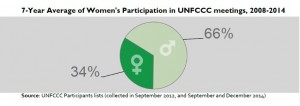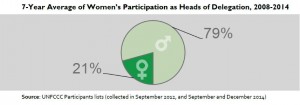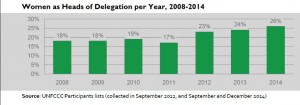LIMA, PERU (December 12, 2014) — WEDO team members published numerous articles during the two weeks of COP20, focused on the interlinkages between gender and climate change. The articles emphasize the intersectionality of gender relating to disaster risk reduction, health, forests, human rights and transportation.
In her article, DRR: Coherence, Rights and Resilience, WEDO’s Eleanor Blomstrom presents readers with a case for the importance of a diverse leadership for effective decision making to appropriately address disasters, climate change and sustainable development. The article also emphasizes that gender equality should be at the core of disaster risk reduction strategies and such strategies should also include investments in health services.
Yeniva Massaquoi and Latha Swamy further explore The fundamental link between climate change, health and gender and identify that climate change impacts are not gender neutral. As the primary household collectors of water and fuel, women bear the added burden of climate change impacts in the case presented.
WEDO’s Latha Swamy interviewed Gertrude Kabusimbi Kenyangi in Connecting the dots: Relating forests and food to women’s empowerment and community resilience at the COP20 negotiations. Ms. Kenyangi is from Support for Women in Agriculture and Environment (SWAGEN) Uganda, and she is working at the grassroots level to enhance the resilience of women and their communities by establishing forest resources on their own lands.
On Human Rights Day, Yeniva Massaquoi shared The Underbelly of Article (6): Instrumentalizing the Right to Public Participation under the UNFCCC, highlighting the importance of protections for women’s human rights and environmental defenders.
In Including gender considerations in transportation: An important step towards mitigation, Beatrice Mauger and Gina Stovall from WEDO investigate the role that transport systems should have in recognizing the diversity of users, and that by collecting and analyzing gender differentiated data, transportation services can be more gender responsive.
Finally, WEDO Fellow, Camille Andre, kicked off COP20 launching WEDO’s latest report, Ensuring Women’s Access and Influence on Climate Change Policy, highlighting the Women Delegates Fund (WDF) program, which works to enhance women’s participation and leadership in climate negotiations.
The most updated information on women’s participation at the UNFCCC was released at the end of week one, and the insert to WEDO’s WDF Report can be found here.






